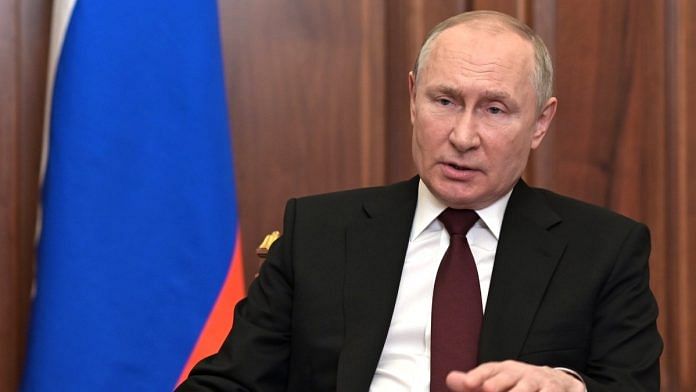
Thank you dear subscribers, we are overwhelmed with your response.
Your Turn is a unique section from ThePrint featuring points of view from its subscribers. If you are a subscriber, have a point of view, please send it to us. If not, do subscribe here: https://theprint.in/
In popular imagination Russia has been portrayed as a muscular, secure and self-confident country which the United States and its Atlantic allies had ceased to be. Putin and his new Russia, while anathema to the liberal establishment, was a role model to many including the former American president. He embraced militarism, talked tough on terror and cracked down on common enemies of the populist right being feminists and gay rights activists. If America was in decline headed by a hapless caretaker president, Russia and the more long-term threat China was ascendant. Then came Putin’s invasion of Ukraine which most guessed would be quick and decisive. Despite no outcome yet, the consequences have been disastrous for Putin and the broader narrative of authoritarianism’s superiority.
In addition to a stalled advance the feckless West has found its backbone and imposed crippling sanctions forcing Russians to line up in ATM queues like its 1991 all over again. Germany announced it would live up to its NATO expenditure commitments with Finland considering membership. Meanwhile Russia’s economy is in embers with Putin’s curated strongman image and Russian invincibility in tatters. While some of it is the result of Putin’s apparent miscalculations it also reveals the risk of an overreliance on strength projection and the dangerous feedback loop this brings. In a democracy, shortcomings are transparently discussed amidst partisan bickering. However unsightly, these self-critiques and public accountability force a virtuous cycle of self-improvement and an accurate assessment of one’s capabilities. An example is America’s F35 program where Congress and the American public was made aware of the issues and cost overruns.
Russia on the other hand did what the Americans call drinking one’s own Kool-Aid. They believed their own hype. All those famous parades of strength on Red Square, propaganda channels, drip-fed nationalism and sabre-rattling have so far proven inadequate in achieving Putin’s objectives in Ukraine. While the outcome is far from settled and there is the usual fog of war reporting, raw military strength has not extinguished a much weaker but indefatigable resistance. While the absolutist powers of Putin have provided the country a veneer of strength and pride, the centralisation makes him the Achilles heel. His miscalculation and revanchist goals have made his country collateral damage. Surrounded by yes men and a culture of fear, sharing bad news is disincentivised. Better to embellish figures and please Dear Leader. He is insulated from the hardships of his people that his decisions bring with no electoral wrath to face. Democracies like America and India, having experienced subpar leaders of their own endured despite poor leaders and decisions due to checks and balances. For all the pre-2016 talk of the horrors of Trump having the nuclear codes, the headlines now refer to Putin ordering his own arsenal on standby.
Where does this bring India? While there are legitimate concerns regarding India’s erosion of democracy, the fact of the matter is it remains one. However, there is a common theme in India’s discourse, a parallel universe where it would be like China if it adopted a dictatorship, untethered from the electoral weight of those “Biharis” demanding their kerosene subsidy instead of expressways and Rafales. India should be strong like Russia and reclaim its civilisational glory or “Akhand Bharat”. Surely this episode shows that countries don’t operate on a blank canvas. If India ever flirts with a one-party takeover, the global capital markets will take notice and dish out punishment accordingly. Putin’s speech implied he wanted the Russian Empire restored with Ukraine being Lenin’s artificial creation. The Ukrainians didn’t share the same sentiment and fought back. As a theoretical exercise, does dreaming of Akhand Bharat, where Bangladesh cedes itself to India because of shared history under the Maurya Empire, sound any more rational? History is a story of great powers at the epicentre of a sphere of influence. In a globalised world, however stressed, this phenomenon is weakened with state sovereignty elevated above “might makes right”. If there’s two lessons, we as Indians can draw from this bloody invasion it is the fragility of dictatorships and redundancy of Empire.
Also read: Students’ Ukraine nightmare triggers furore over medical fees in Bihar, Nitish ‘can’t do much’
These pieces are being published as they have been received – they have not been edited/fact-checked by ThePrint.


COMMENTS